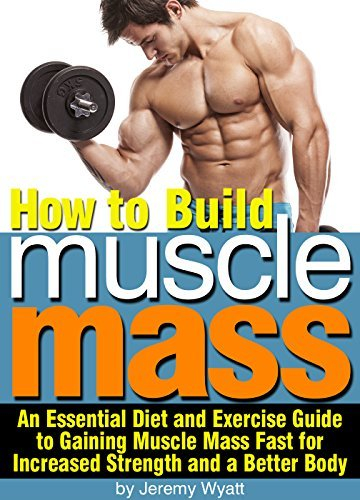The Essential Guide on How to Build Muscle Fast
You’re ready to transform your body, to chisel it into its best version yet. Picking up random weights on and off clearly isn’t cutting it, thus you’re set to embark on a dedicated journey to build muscle, and build it fast. You don’t just want to get big, you want to do it in the healthiest and the most efficient way possible. This essential guide illuminates this process with science-backed, highly effective strategies that will shift the odds in your favor. It answers the lingering questions you may have and dispels common misconceptions about muscle-building. So gear up to redefine your physique and unlock its full potential.

Understanding Basic Biological Mechanisms
To understand muscle building, it’s useful to have a basic understanding of the underlying biological processes. Your muscles don’t get bigger and stronger from the actual act of lifting weights. Instead, the strain of resistance training causes microscopic damage to the muscle fibers, to which your body responds by repairing the tissues and adding more protein strands – a process called protein synthesis.
Basics of Muscle Gain
Building muscle depends upon three basic factors: genetics, diet, and exercise regimen. Although we can’t control our genetics, we can control the latter two. Gaining muscle involves repeated cycles of damaging muscle fibers through weight training, then healing and adapting to build more muscle mass. This process involves creating a caloric intake and workout regimen that suits your body type and goals.
Importance of Protein Synthesis
Protein synthesis is your body’s process of repairing and thickening muscle fibers after exercise, leading to muscle growth. The more protein your cells synthesize, the bigger your muscles grow. Thus, part of building muscle involves ensuring your system has ample protein to complete this process.
Understanding Muscle Hypertrophy
Muscle hypertrophy, the process of muscle enlargement, results from a growth in the size of its component cells. There are two types of hypertrophy, sarcoplasmic and myofibrillar. Sarcoplasmic hypertrophy focuses on increased muscle glycogen storage while myofibrillar hypertrophy contributes to muscle fiber size.
Set Realistic Goals and Monitoring Progress
Building muscle is a journey, and you’ll need patience and perseverance as you go through it.
Determining Your Type and Tempo
We’re all unique, and so are our bodies. Factors like your body type, metabolism, and genetics affect your muscle gain. Understanding these can help you design the most effective workout routine for you.
Setting Short-Term and Long-Term Goals
Setting goals gives direction to your efforts and helps you stay motivated. Your short-term goals might involve progress within weeks or months, while your long-term goals could encase transformation targets over years.
Tracking Progress
Monitoring your progress is crucial in staying inspired and on track. Measure your weight, check your body composition, and even take regular photos to log visual progress. This can also provide insight into tweaks you might need to make in your routine or diet.
Avoiding Unrealistic Expectations
While it’s great to aim high, setting unrealistic expectations can lead to frustration, burnout, and even injury. Remember, muscle gain is a gradual process.
Designing an Optimal Workout Plan
A well-designed workout plan is critical to ensuring effective muscle gain.
Key Elements of Effective Workouts
Effective workouts need to include elements that challenge your muscles to their capacity, gradually increasing resistance, and incorporating both isolation and compound exercises.
Understanding Resistance Training
Resistance training involves working against a force to build muscle mass. The resistance can be in the form of weights, resistance bands or your body weight. Proper form and progressive overload are key to benefit from this kind of training.
Planning Your Workout Schedule
A well-designed workout schedule involves targeting different muscle groups on different days, giving each group adequate rest before the next session.
Role of Rest and Recovery
Rest and recovery are essential for gaining muscles as it’s actually during this time that your body rebuilds and strengthens your muscles.
Role of Diet in Muscle Building
The right diet is just as important as your workout in building muscle.
Understanding Caloric Surplus
To build muscle, your body requires more energy than it consumes, known as a caloric surplus. This doesn’t mean overeating, but rather strategically increasing your calorie intake with nutrient-rich foods.
Balancing Protein Consumption
While protein is crucial for muscle growth, balance is key. Aim for a mix of lean meat, dairy, eggs, and plant-based sources throughout the day to provide your muscles with a constant supply of protein.
Importance of Complex Carbohydrates
Carbohydrates provide the energy you need to train hard. Complex carbs such as brown rice, quinoa, oats, and sweet potatoes provide a slow and sustained release of energy.
Healthy Fats for Muscle Recovery
Healthy fats not only provide energy but also help in hormone production, crucial for muscle growth and recovery.

The Science of Supplements
Supplements can help meet your nutritional intake and boost your workout performance.
Effectiveness of Different Supplements
Different supplements offer different benefits. For instance, whey protein aids in protein synthesis, while creatine provides energy for high-intensity workouts.
Key Supplements for Muscle Gain
Whey protein, BCAAs, and creatine are among the preferred supplements for muscle gain.
Integral Micronutrients
Micronutrients, though required in small amounts, play crucial roles in muscle building and recovery. Vitamins A, D, and E, and minerals like iron, calcium, and magnesium are few examples.
Safety and Opposite Effects
While supplements can benefit muscle building, not all are safe or suitable for everyone. Always do your research or consult a healthcare professional before starting a new supplement regimen.
Sleep and Muscle Recovery
Sleep is when a lot of your muscle repair and recovery happen.
Understanding the Relation of Sleep and Muscle Recovery
During sleep, your body releases growth hormones that help repair and grow your muscles. Poor sleep can hinder this process and limit your gains.
Importance of Adequate Sleep
Most individuals need 7-9 hours of sleep per night for optimal muscle recovery.
Tips for Quality Sleep
Stick to a sleep schedule, create a relaxing bedtime routine and make your sleep environment comfortable and conducive to good rest.
Maintain Consistency and Motivation
Consistency is key in muscle building, and maintaining motivation is central to that consistency.
Maintaining Workout Routine
Find a workout routine that isn’t just effective, but also enjoyable. This will make it easier to stick to in the long run.
Staying Motivated
Finding sources of motivation such as setting goals, tracking your progress, and having a workout buddy can keep you enthusiastic and regular with your workouts.
Dealing with Plateaus and Slumps
At times, your progress might stall, or you might feel unmotivated. Experiment with your workout or diet, or take a few days off to rejuvenate.
The Importance of Hydration
Hydration is necessary for general health and muscle function.
Hydration and Muscle Building
Efficient hydration maintains muscle flexibility, lubrication, and the transport of nutrients – vital for muscle growth and recovery.
Determining Your Hydration Needs
This largely depends on factors such as your weight, the climate you live in, and your exercise intensity and duration.
Hydration During and After Workout
Drinking water during and after a workout helps to replace fluids lost through sweat, thus preventing dehydration.

Injury Prevention and Dealing with Pain
Training smart and safe goes a long way in muscle building.
Avoiding Common Injuries
Proper warm up, using the correct form, and not lifting too heavy are some ways to avoid common lifting injuries.
Proper Form and Technique
Maintaining correct form not only helps avoid injuries but also ensures that you’re effectively targeting the intended muscles.
Understanding Good Pain Vs Bad Pain
Good pain, like the burn you feel during a workout or mild soreness after, indicates you’re challenging your muscles. Bad pain, such as sharp or persistent pain, could be a sign of injury.
Rest and Recovery from Injuries
In case of an injury, rest and seek proper treatment immediately. Pushing through the pain can cause further damage and longer recovery time.
FAQ on Building Muscle Fast
Here are answers to some common muscle-building queries.
How Long Does it Take to Build Muscle?
It’s different for everyone and depends on various factors like your genetic makeup, workout routine, and diet. Generally, with consistent training and proper nutrition, significant improvement can be seen in 3 to 6 months.
What Foods Support Muscle Growth?
High-protein foods, complex carbohydrates, and healthy fats are all essential for muscle growth. This includes lean meats, fish, eggs, dairy, whole grains, fruits and vegetables, nuts, and seeds.
How Many Reps and Sets Are Optimal for Muscle Growth?
This can vary depending on your fitness level and goals. Generally, for muscle growth, 6-12 reps of 3-6 sets with heavier weights are suggested.
How Often Should I Change My Workout Routine?
To avoid plateaus, it’s beneficial to switch up your routine every 6-8 weeks. This can mean changing exercises, the number of sets or reps, or the weight you’re lifting.
Does One Have to Lift Heavy for Muscle Gain?
While lifting heavy promotes hypertrophy, it’s not the only way to gain muscle. High-rep, low-weight training can also be effective when done correctly. What’s most important is that you’re challenging your muscles and progressively overloading them.


